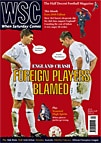 Even bigger than the headlines about England's exit were the figures estimating its cost. Roger Titford looks at what it will really mean for sponsors, business generally and the marketability of football
Even bigger than the headlines about England's exit were the figures estimating its cost. Roger Titford looks at what it will really mean for sponsors, business generally and the marketability of football
Euro 2008 will be the first such tournament without an English-speaking nation since the eight-team European Championship finals in France in 1984. For the football purist, this may be a good thing. For the marketing man, it is a bit of a disaster. On Thursday November 22, Britain’s marketing community awoke to see an enormous hole blown in media plans and promotional schedules across the entire range of consumer goods. Worst affected will be the official commercial partner companies with events and activities planned around England’s summer participation. The typical, rudderless bloke in the supermarket won’t be wearing his new Umbro England shirt and loading his trolley with cases of cheap Carlsberg in anticipation of Austria v Romania. Eat Turkey! Drink Greece! Sleep Switzerland! This tournament is not going to work for the uncommitted UK target audience.
So annoyed executives will be confronting the dilemma of either replacing the activity with the likes of monster truck wrestling or daringly spinning a new line such as support “our” brave Poles in the Euros. “We will be trying to persuade fans who can’t support with their patriotic hearts to invest with their wallets and become an honorary German, Croat or Italian,” said bookmakers William Hill.
The day-after doom-mongers competing for the headlines have gone as far as suggesting the whole economy could lose out. “A successful run to the 2008 final would have led to a £2 billion bonanza for the economy,” said Simon Chadwick, professor of sport business strategy and marketing at Coventry Business School, ignoring the fact that England have only twice gone beyond the group stages.
By way of comparison, Northern Rock currently owes the taxpayer £25bn and the authoritative British Retail Consortium estimates that the higher-profile 2006 World Cup earned the country a mere £1bn. This extra billion is problematic, too. Some of these purchases, such as new TV sets, are simply brought forward while others aren’t what you would call helpful in the general scheme of things. Provided all the money that would have been spent on extra beer, burgers and betting is not now diverted into dog-fighting, crack and pornography, the nation should spend it on something useful. Perhaps this can be the summer of collectively “getting those shelves put up”.
The idea that national productivity goes up because of a feel-good factor (anyone recalling the 2000 tournament take a deep breath here) is one that flies in the face of general observation. What might have been true in the factories of Coventry and Sunderland decades ago seems less plausible among the texting, emailing, phoning-in sick and constantly pub-TV-watching service-industry workers of today.
There are genuine losers, not least the Football Association, who probably budgeted for qualification and a minimum of £5 million tournament revenue (not profit) from participation. Instead they face embarrassing conversations with commercial partners and very large cheque stubs as leaving cards for Steve and Terry. The sportswear manufacturers Umbro and major retailers have taken immediate hits on their share prices. The away kit for 2006 had been one of the great shirt sellers of all time and now there is a rather long gap until 2010.
The negative impact on the game will be more subtle and longer-term than the instant, scare-mongering figures. This failure shows that the England national team are not a bankable, reliable commodity in the same way that, say, Manchester United or Chelsea are as Champions League qualifiers. If there is one thing that the international marketing community is more “passionate about” and “engaged with” than football, it is predictability. Hollywood blockbusters arrive on time, the date of Halloween is sorted, Easter eggs can safely be in-store the day after Valentine’s. The England team have gone missing from the marketing plan and this will have been noted. Not only will this have a detrimental effect on the big club versus country battle – which the country is slowly losing – but also on the football versus other sports battle.
There are increasing whimpers of commercial support for stars such as Jonny Wilkinson and Lewis Hamilton. Euro 2008 was the chance for football, for England, the big dog, to bark back, to say to the international marketing community: “This is the one that really matters, this is the one that gets people flying the flag of St George on their cars for a month, that is the modern age festival that captivates the nation.” Instead, in England, there is an empty space in the diary. In the future there is a danger that sports such as rugby union, golf, motor racing and cricket, where qualification and local or home participation are virtually guaranteed, will gain from football.
From WSC 251 January 2008